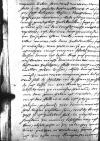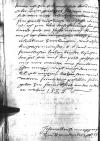 AAWO, AB, D.68, f. 96r
AAWO, AB, D.68, f. 96r
Erwyrdiger wesunderer gutter her und freundt.
Woe es E(uer) L(ieb) nach allem yrem gefallen gluckseliglich und wol zustundt, / auch frisch und gesundt were(n), horet ich von hertzen gern, / und las E(uer) L(ieb) wysse(n), das ich istz von den gnaden Gottes auch frisch und gesundt pin, Gott hab lobe und gebe lang, / da mit mir enanten mit freuden sehen mug(en).
Ich wyl E(uer) L(ieb) auch nicht verhalt(en), das ich nach negst versinener weynacht(en), / mich mit meynem freuntlichen lieben bruder ⌊marggraff(en) Friderichen⌋ dem thumprobst zu ⌊Wyrtzburgk⌋ erhoben und zw ⌊keyserlicher maiestet⌋ gezogen, / pey yr maiestet belibenn pis ir mayestet uber das gebirg hadt wellen zyhen, / alda hab ich meinen abschidt von yr maiestet genomen, / und wyderumb in ⌊Theutzlandt⌋ gefuget, / meinen freuntlichen lieben bruder pey yr maiestet gelassen, / ist mit ubers gebirg zogen zw ⌊Nissa⌋ an der rure kranck word(en). Und uber mere gen ⌊Genoua⌋ faren mussen, / alda etliche tag kranck geleg(en) und den 20 Augusti in Gott verschiden. Gott welle der selen gnedig und barmhertig sein, / alsodt mussen wir ms. mir(!)
⌈wirwir ms. mir(!)
⌉ marggraff(en) albey einen aus uns verzollen, / Gott wolt das dy uberichen etban genisen mocht(en).
Dy ursach meins abzyhens kan ich E(uer) L(ieb) auch nicht verhalt(en), darzw ich mich dan alles guttes thue versehen als zw  AAWO, AB, D.68, f. 96v meynem lieben hern und vattern, / nemlich hidden by binding⌈[ich]ich hidden by binding⌉ hadt es dy gestalt, / doch wollens E(uer) L(ieb) alsodt pey sich beleyben lassen. / Nachdem fil episcopata vacireten, / bade ych ⌊yr maiestet hidden by binding⌈[t]t hidden by binding⌉⌋, mich gnediglich zubedencken, / sage yr imm(?) hidden by binding⌈[imm(?)]imm(?) hidden by binding⌉er were istz in den leufft(en) nicht moglich repetiret, /ich das mir doch yr maiestet ein zusagen than wolt, / woe weyter etbas vaciret, als dan zubedencken. / Sag ⌊yr maiestet⌋, / tam poco non se po fare, / p[...] hidden by binding⌈[...][...] hidden by binding⌉ ich weyter mich meyner schuld(en) zuentri[...] hidden by binding⌈[...][...] hidden by binding⌉ lassen damit ich dysen krig pey ⌊yr maiestet hidden by binding⌈[et]et hidden by binding⌉⌋ aufbarten mocht, dan mir an das nit mog hidden by binding⌈[og]og hidden by binding⌉lich were zufolgen, / hadt mir auch nicht wellen geben lassen, / alsodt das ich denken hidden by binding⌈[ken]ken hidden by binding⌉ must, / man were meyner gern ledig und hab dy schuldt in dy schantz geschlo[...] hidden by binding⌈[...][...] hidden by binding⌉ dy sich lefft in 5000 ducat(en), / und ein abschidt von yr maiestet genom(m)en, / der mir dan gern geben ist worden, / so s[...] hidden by binding⌈[...][...] hidden by binding⌉ mich das halb iare als ich pey ir maiestet hidden by binding⌈[tet]tet hidden by binding⌉ gebesen, / gestand(en) / 7000 cronen. / Mus also Gott lassen pefollen sein, / und dy kurtze zeyt, so ich zuleben hab, / in meyne(n) armen hidden by binding⌈[en]en hidden by binding⌉ heuslein zu ⌊Meintz⌋ behelffen, wy ich kann. / Alsodt gehet es zu, / ie lenger einer dinet, y we(n)ger er verdinet. / Ferner hab ich zw Asta(?) mit ⌊koniglicher maiestet hidden by binding⌈[et]et hidden by binding⌉
AAWO, AB, D.68, f. 96v meynem lieben hern und vattern, / nemlich hidden by binding⌈[ich]ich hidden by binding⌉ hadt es dy gestalt, / doch wollens E(uer) L(ieb) alsodt pey sich beleyben lassen. / Nachdem fil episcopata vacireten, / bade ych ⌊yr maiestet hidden by binding⌈[t]t hidden by binding⌉⌋, mich gnediglich zubedencken, / sage yr imm(?) hidden by binding⌈[imm(?)]imm(?) hidden by binding⌉er were istz in den leufft(en) nicht moglich repetiret, /ich das mir doch yr maiestet ein zusagen than wolt, / woe weyter etbas vaciret, als dan zubedencken. / Sag ⌊yr maiestet⌋, / tam poco non se po fare, / p[...] hidden by binding⌈[...][...] hidden by binding⌉ ich weyter mich meyner schuld(en) zuentri[...] hidden by binding⌈[...][...] hidden by binding⌉ lassen damit ich dysen krig pey ⌊yr maiestet hidden by binding⌈[et]et hidden by binding⌉⌋ aufbarten mocht, dan mir an das nit mog hidden by binding⌈[og]og hidden by binding⌉lich were zufolgen, / hadt mir auch nicht wellen geben lassen, / alsodt das ich denken hidden by binding⌈[ken]ken hidden by binding⌉ must, / man were meyner gern ledig und hab dy schuldt in dy schantz geschlo[...] hidden by binding⌈[...][...] hidden by binding⌉ dy sich lefft in 5000 ducat(en), / und ein abschidt von yr maiestet genom(m)en, / der mir dan gern geben ist worden, / so s[...] hidden by binding⌈[...][...] hidden by binding⌉ mich das halb iare als ich pey ir maiestet hidden by binding⌈[tet]tet hidden by binding⌉ gebesen, / gestand(en) / 7000 cronen. / Mus also Gott lassen pefollen sein, / und dy kurtze zeyt, so ich zuleben hab, / in meyne(n) armen hidden by binding⌈[en]en hidden by binding⌉ heuslein zu ⌊Meintz⌋ behelffen, wy ich kann. / Alsodt gehet es zu, / ie lenger einer dinet, y we(n)ger er verdinet. / Ferner hab ich zw Asta(?) mit ⌊koniglicher maiestet hidden by binding⌈[et]et hidden by binding⌉  AAWO, AB, D.68, f. 97r von Polen⌋ ⌊oratoren⌋ geret und auch allerla angeczachent, / wy ich dan offt mit E(uer) L(ieb) auch geret, / ab ich einmal von koniglicher maiestet von Polen / gnediglich mocht bedacht werd(en), /das mich doch ⌊yr maiestet⌋ irgent mit einer pension versorget. Das schreyb ich elandt darumb, / ab sich begebe, das E(uer) L(ieb) zw im keme, / mocht(en) E(uer) L(ieb) und er gutte ferderer darzw sein.
AAWO, AB, D.68, f. 97r von Polen⌋ ⌊oratoren⌋ geret und auch allerla angeczachent, / wy ich dan offt mit E(uer) L(ieb) auch geret, / ab ich einmal von koniglicher maiestet von Polen / gnediglich mocht bedacht werd(en), /das mich doch ⌊yr maiestet⌋ irgent mit einer pension versorget. Das schreyb ich elandt darumb, / ab sich begebe, das E(uer) L(ieb) zw im keme, / mocht(en) E(uer) L(ieb) und er gutte ferderer darzw sein.
So ist her ⌊Achacius von Zeme⌋ / auch alhy pey mir gebesen, / der mir fil grusses von E(uer) L(ieb) angezachent hadt, / des ich mich dan freuntlich thue bedancken, / mit erpitung, wo ich E(uer) L(ieb) wuste zudinen. Das mich dy sel alzeyt im alt(en) glauben spuren sel, / wy dan E(uer) L(ieb) albeg zu mir und ich zu E(uer) L(ieb) getrag(en) haben, / er wurdt zum dritten man auch gut der zu sein, dan ich vernim, er hab gar ein gnedig(en) ⌊konig⌋, / selchs alles wyl ich zw E(uer) L(ieb) wolgefallen gestelt haben. /
Und las E(uer) L(ieb) auch wyssen, das ich istz alhy zu ⌊Franckfordt⌋ auff dem tag pin, do ich mich dan mit meynem freuntlichen lieben bruder, dem ⌊hertzog(en) in Preussen⌋ freuntlich underrethet hab. / Ist E(uer) L(ieb) im pesten auch offt gedacht worden. / Ich wolt gern mit s(einer) l(ieb) hynein gezogen sein  AAWO, AB, D.68, f. 97v damit ich zw E(uer) L(ieb) auch hedt kom(m)e mug(en). Aber mein gnediger ⌊her von Meintz⌋ hadt mir nicht erlauben wellen, / dy w[...] hidden by binding⌈[...][...] hidden by binding⌉ sein gnade noch nicht im stifft ⌊Meintz hidden by binding⌈[z]z hidden by binding⌉⌋ ist. / Ich pin aber der hoffnung, sein gnaden hidden by binding⌈[aden]aden hidden by binding⌉ werdt palt in stiffte ⌊Meintz⌋ komen, / wyl ich dan muglichen vleys furben[...] hidden by binding⌈[...][...] hidden by binding⌉ erlaubnus zuerlangen, / und alsdan ⌊konigliche maiestet⌋, / E(uer) L(ieb) und mein freuntlichen lieben ⌊bruder⌋ besuchen. Das geb Gott und das paldt geschehe dar hidden by binding⌈[r]r hidden by binding⌉mit mir ananter mit freudenn sehen mug(en). /
AAWO, AB, D.68, f. 97v damit ich zw E(uer) L(ieb) auch hedt kom(m)e mug(en). Aber mein gnediger ⌊her von Meintz⌋ hadt mir nicht erlauben wellen, / dy w[...] hidden by binding⌈[...][...] hidden by binding⌉ sein gnade noch nicht im stifft ⌊Meintz hidden by binding⌈[z]z hidden by binding⌉⌋ ist. / Ich pin aber der hoffnung, sein gnaden hidden by binding⌈[aden]aden hidden by binding⌉ werdt palt in stiffte ⌊Meintz⌋ komen, / wyl ich dan muglichen vleys furben[...] hidden by binding⌈[...][...] hidden by binding⌉ erlaubnus zuerlangen, / und alsdan ⌊konigliche maiestet⌋, / E(uer) L(ieb) und mein freuntlichen lieben ⌊bruder⌋ besuchen. Das geb Gott und das paldt geschehe dar hidden by binding⌈[r]r hidden by binding⌉mit mir ananter mit freudenn sehen mug(en). /
Wyl mich darmit E(uer) L(ieb) als meinem lieben hern und vattern freuntlich pefollen haben.
 AAWO, AB, D.68, f. 96v meynem lieben hern und vattern, / nemlich hidden by binding⌈[ich]ich hidden by binding⌉ hadt es dy gestalt, / doch wollens E(uer) L(ieb) alsodt pey sich beleyben lassen. / Nachdem fil episcopata vacireten, / bade ych
AAWO, AB, D.68, f. 96v meynem lieben hern und vattern, / nemlich hidden by binding⌈[ich]ich hidden by binding⌉ hadt es dy gestalt, / doch wollens E(uer) L(ieb) alsodt pey sich beleyben lassen. / Nachdem fil episcopata vacireten, / bade ych  AAWO, AB, D.68, f. 97r von Polen
AAWO, AB, D.68, f. 97r von Polen AAWO, AB, D.68, f. 97v damit ich zw E(uer) L(ieb) auch hedt kom(m)e mug(en). Aber mein gnediger
AAWO, AB, D.68, f. 97v damit ich zw E(uer) L(ieb) auch hedt kom(m)e mug(en). Aber mein gnediger 


